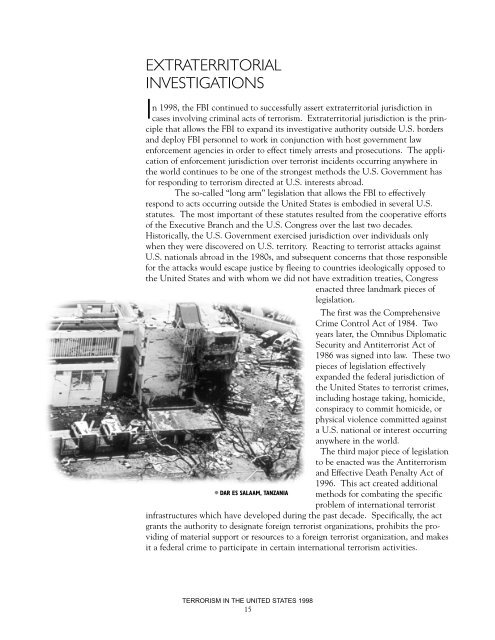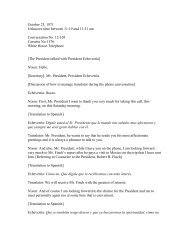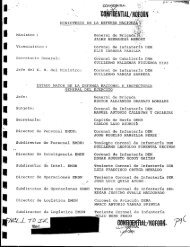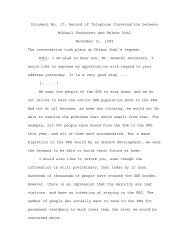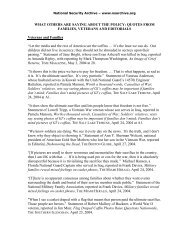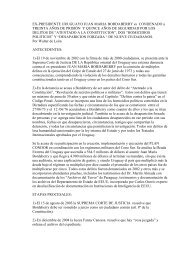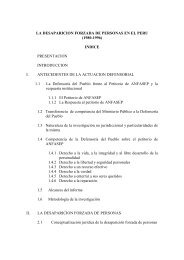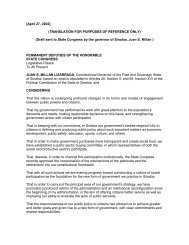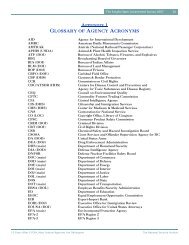TERRORISM 98 - FBI
TERRORISM 98 - FBI
TERRORISM 98 - FBI
Create successful ePaper yourself
Turn your PDF publications into a flip-book with our unique Google optimized e-Paper software.
EXTRATERRITORIAL<br />
INVESTIGATIONS<br />
In 19<strong>98</strong>, the <strong>FBI</strong> continued to successfully assert extraterritorial jurisdiction in<br />
cases involving criminal acts of terrorism. Extraterritorial jurisdiction is the principle<br />
that allows the <strong>FBI</strong> to expand its investigative authority outside U.S. borders<br />
and deploy <strong>FBI</strong> personnel to work in conjunction with host government law<br />
enforcement agencies in order to effect timely arrests and prosecutions. The application<br />
of enforcement jurisdiction over terrorist incidents occurring anywhere in<br />
the world continues to be one of the strongest methods the U.S. Government has<br />
for responding to terrorism directed at U.S. interests abroad.<br />
The so-called “long arm” legislation that allows the <strong>FBI</strong> to effectively<br />
respond to acts occurring outside the United States is embodied in several U.S.<br />
statutes. The most important of these statutes resulted from the cooperative efforts<br />
of the Executive Branch and the U.S. Congress over the last two decades.<br />
Historically, the U.S. Government exercised jurisdiction over individuals only<br />
when they were discovered on U.S. territory. Reacting to terrorist attacks against<br />
U.S. nationals abroad in the 1<strong>98</strong>0s, and subsequent concerns that those responsible<br />
for the attacks would escape justice by fleeing to countries ideologically opposed to<br />
the United States and with whom we did not have extradition treaties, Congress<br />
enacted three landmark pieces of<br />
legislation.<br />
The first was the Comprehensive<br />
Crime Control Act of 1<strong>98</strong>4. Two<br />
years later, the Omnibus Diplomatic<br />
Security and Antiterrorist Act of<br />
1<strong>98</strong>6 was signed into law. These two<br />
pieces of legislation effectively<br />
expanded the federal jurisdiction of<br />
the United States to terrorist crimes,<br />
including hostage taking, homicide,<br />
conspiracy to commit homicide, or<br />
physical violence committed against<br />
a U.S. national or interest occurring<br />
anywhere in the world.<br />
The third major piece of legislation<br />
to be enacted was the Antiterrorism<br />
and Effective Death Penalty Act of<br />
1996. This act created additional<br />
● DAR ES SALAAM, TANZANIA methods for combating the specific<br />
problem of international terrorist<br />
infrastructures which have developed during the past decade. Specifically, the act<br />
grants the authority to designate foreign terrorist organizations, prohibits the providing<br />
of material support or resources to a foreign terrorist organization, and makes<br />
it a federal crime to participate in certain international terrorism activities.<br />
<strong>TERRORISM</strong> IN THE UNITED STATES 19<strong>98</strong><br />
15


